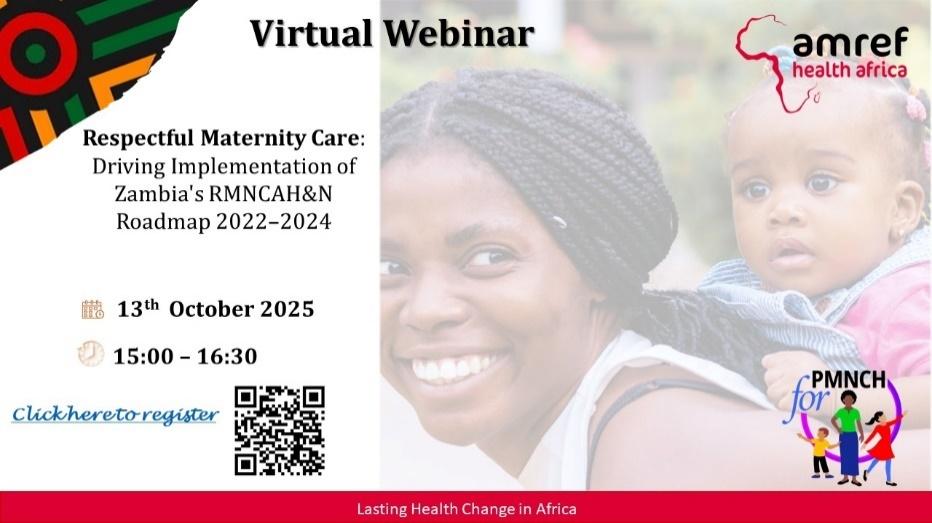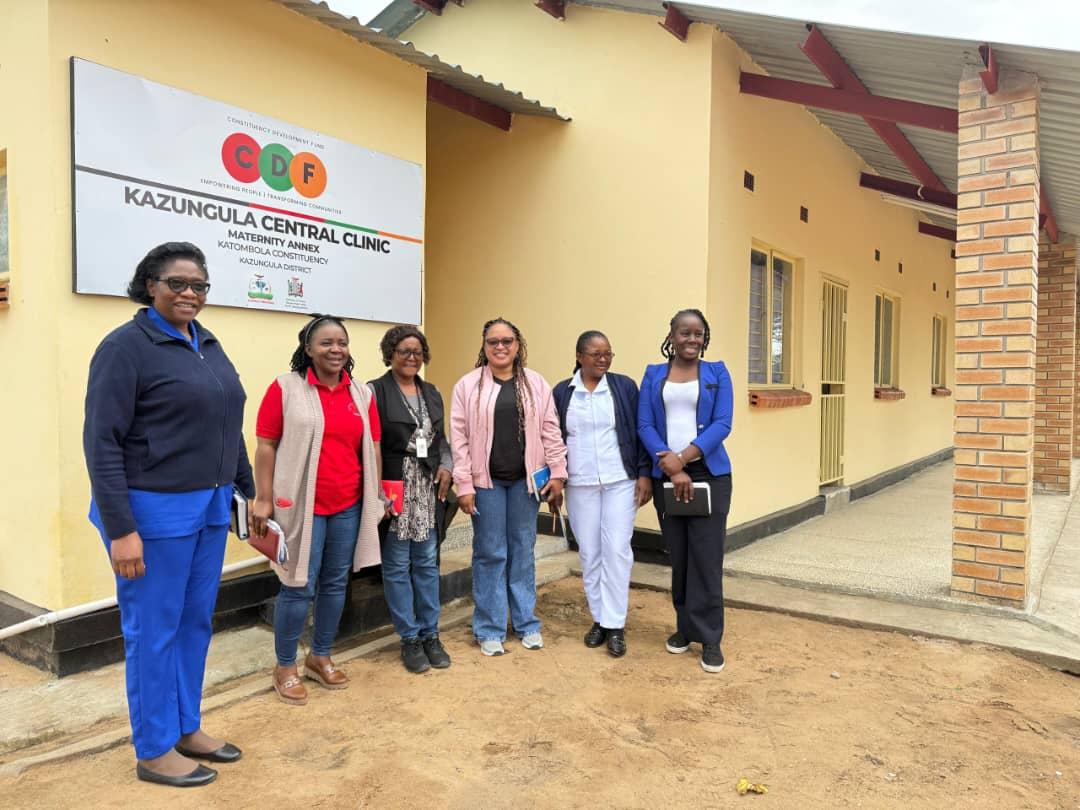
Maternal health is like a bridge: each act of care, from prenatal visits to safe deliveries, forms a vital link that connects women and adolescent girls to dignity and trust. Building and maintaining this bridge requires many hands and hearts working together, grounded in respect and shared humanity. This spirit came vividly to life during the recent Respectful Maternity Care (RMC) national webinar organized by Amref Health Africa Zambia, where parliamentarians, civil society advocates, health professionals and development partners came together to reaffirm that progress begins when togetherness meets commitments.
Anchored in the Zambia Reproductive, Maternal, Newborn, Child, Adolescent Health and Nutrition (RMNCAH&N) Roadmap (2022–2026) and the Respectful Maternity Care (RMC) Roadmap (2024–2028), the webinar provided a platform to explore how to scale up efforts to institutionalize RMC nationwide, ensuring that principles of dignity, compassion and respect translate into standard practice at all levels of the Zambian health system.
Political leadership for women’s and adolescents’ health
Through the Parliamentary Caucus on Sexual and Reproductive Health (SRH), chaired by Hon. Twaambo Mutinta, Zambia is shaping political leadership and accountability for women’s and adolescents’ health. The Caucus is deepening MPs’ understanding of the principles of investing in health as a form of capacity development and is helping to align national priorities with community needs.
These efforts are already making a difference. Parliamentary debates now increasingly reflect the priorities identified through community engagement and collaboration with partners such as Amref Health Africa Zambia. H.E. President Hakainde Hichilema’s pronouncement that every constituency will have a maternity annex stands as a concrete result of this political momentum. Women across the country have welcomed these facilities as spaces that allow them to deliver safely and with dignity.
Yet, as Hon. Mutinta reminded participants, maternal health does not end with childbirth. “We must also focus on postnatal care,” he said. “Investing in safe delivery is essential, but so is ensuring that mothers and newborns continue to receive the care and attention they deserve afterward.” The government’s ongoing procurement of ambulances to strengthen referral systems across three key maternal health centres is an important step in reducing transport related barriers that prevent women and adolescent girls from receiving the treatment they need. These barriers include stigma and misconceptions, financial constraints and inadequate patient engagement. All this too often costs lives.
The human face of respectful maternity care
A powerful moment of the webinar came from Professor Concepta, President, Midwifery Association in Zambia, who brought a deeply human dimension to the discussion on respectful maternity care. Her intervention reminded all participants that RMC is not merely a technical standard or a policy framework but it entails a reflection of how society values its women.
“When a woman comes to a midwife,” she said, “she shows herself in many ways: biologically, psychologically, culturally. She is vulnerable. And how we receive her, how we speak to her, how we touch her, determines not only her experience of childbirth but her sense of dignity.”
 A group of midwives standing in front of a maternity annex in Kazungula Central Clinic
A group of midwives standing in front of a maternity annex in Kazungula Central Clinic
Prof. Concepta highlighted that midwives and health workers must be empowered not just with skills and guidelines but also with empathy, patience and deep understanding. Concepts such as privacy, cleanliness and kindness must be as integral to care as any medical intervention. Maternity annexes should be designed not only for safety but also to uphold dignity and rights, making sure that private spaces, respectful communication and trust are at the centre.
Her message was clear: respectful maternity care is a right. Empowering women begins long before antenatal care, even before conception, by ensuring they know their rights and can make informed choices about their health. Prof. Concepta also urged the health community help midwives document and publish their experiences, noting that “storytelling, data and evidence together can move policymakers by giving advocacy a heartbeat.”
Collaboration as the way forward
Amos Mwale commended Amref Zambia for convening this dialogue, which successfully brought together advocates, decision makers and professional associations. He praised Hon. Mutinta’s leadership and the President’s commitment to expanding maternity annexes, while emphasizing the need to maintain focus on postnatal care, quality services and accountability.
He stressed that the national guidelines on RMC, which will soon be finalized, must be matched by strong implementation. “Our role is to sensitize not only healthcare professionals but also communities, especially traditional leaders, churches, provincial officers, midwives and nurses,” he said. “They are the key interlocutors, the link between policy and people.”
Mr. Mwale underscored the importance of engaging more closely with nurses so that national standards reflect the lived realities of service delivery. He also drew attention to the ongoing national communication strategy aimed at raising awareness of RMC, fighting misinformation across communities and promoting essential confidentiality standards in reproductive health services. “The President has made a clear commitment that no woman should die while giving life,” he concluded. “It is our collective responsibility to hold each other and our leaders accountable for that promise.”
Communities at the heart of change
Webinar panelists stressed that progress will only be sustained if it is community driven. Local and national authorities, midwifery councils and civil society organizations working in communities must continue to assess needs and feed insights back to the National Assembly and ministries. Parliamentarians, in turn, must use this information to influence national debates, committee hearings, caucus discussions and annual budget processes.
As Hon. Mutinta summarized, “People who come to the National Assembly to engage us must be clear about their asks and focus on messages based on evidence and grounded in community realities. Only then can we make decisions that truly respond to the needs of women and adolescents.”
A call to action
The Amref Health Africa Zambia webinar marked an important milestone in advancing respectful maternity care (RMC) in Zambia, where normative guidance and policy debates are grounded in lived experiences. It reaffirmed that RMC is about how care is given as much as what care is given.
“Ensuring that every woman receives respectful, quality care is both a health priority and a reflection of our collective humanity,” reaffirmed Ms. Ilze Kalnina, Team Lead of the Political Advocacy Team at PMNCH, at the close of the webinar, capturing the essence of the insightful discussions held.
As Zambia strengthens its health systems and political commitments, this renewed collaboration among parliamentarians, civil society, and health professionals offers a clear path forward and the need to integrate respectful and quality care into broader efforts to strengthen the national health system. This would help build and make fully operational maternity annexes across all constituencies, so that every woman, wherever she lives, can give birth in safe and dignified conditions.
Achieving this vision will require inclusive engagement: civil society organizations, health professionals, midwives, nurses, obstetricians and gynecologists alongside community health workers and the often-unseen members of the system, such as guards and receptionists, all have a role to play in creating an environment where respect is the foundation of care.
Together, these efforts bring Zambia closer to a future where no woman dies giving life and every birth becomes a moment of dignity, safety and humanity.

.png?sfvrsn=6d0e27cd_1)



